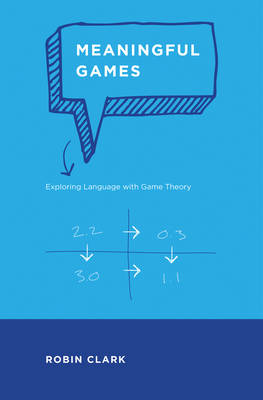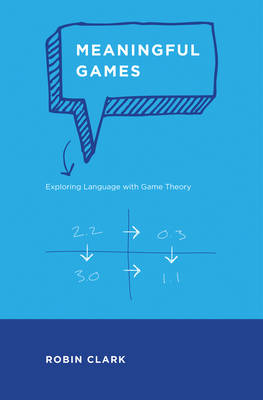
Bedankt voor het vertrouwen het afgelopen jaar! Om jou te bedanken bieden we GRATIS verzending (in België) aan op alles gedurende de hele maand januari.
- Afhalen na 1 uur in een winkel met voorraad
- In januari gratis thuislevering in België
- Ruim aanbod met 7 miljoen producten
Bedankt voor het vertrouwen het afgelopen jaar! Om jou te bedanken bieden we GRATIS verzending (in België) aan op alles gedurende de hele maand januari.
- Afhalen na 1 uur in een winkel met voorraad
- In januari gratis thuislevering in België
- Ruim aanbod met 7 miljoen producten
Zoeken
€ 101,95
+ 203 punten
Omschrijving
An engaging introduction to the use of game theory to study lingistic meaning. In Meaningful Games, Robin Clark explains in an accessible manner the usefulness of game theory in thinking about a wide range of issues in linguistics. Clark argues that we use grammar strategically to signal our intended meanings: our choices as speaker are conditioned by what choices the hearer will make interpreting what we say. Game theory--according to which the outcome of a decision depends on the choices of others--provides a formal system that allows us to develop theories about the kind of decision making that is crucial to understanding linguistic behavior. Clark argues the only way to understand meaning is to grapple with its social nature--that it is the social that gives content to our mental lives. Game theory gives us a framework for working out these ideas. The resulting theory of use will allow us to account for many aspects of linguistic meaning, and the grammar itself can be simplified. The results are nevertheless precise and subject to empirical testing. Meaningful Games offers an engaging and accessible introduction to game theory and the study of linguistic meaning. No knowledge of mathematics beyond simple algebra is required; formal definitions appear in special boxes outside the main text. The book includes an extended argument in favor of the social basis of meaning; a brief introduction to game theory, with a focus on coordination games and cooperation; discussions of common knowledge and games of partial information; models of games for pronouns and politeness; and the development of a system of social coordination of reference.
Specificaties
Betrokkenen
- Auteur(s):
- Uitgeverij:
Inhoud
- Aantal bladzijden:
- 376
- Taal:
- Engels
Eigenschappen
- Productcode (EAN):
- 9780262549189
- Verschijningsdatum:
- 19/09/2023
- Uitvoering:
- Paperback
- Formaat:
- Trade paperback (VS)
- Afmetingen:
- 152 mm x 229 mm
- Gewicht:
- 498 g

Alleen bij Standaard Boekhandel
+ 203 punten op je klantenkaart van Standaard Boekhandel
Beoordelingen
We publiceren alleen reviews die voldoen aan de voorwaarden voor reviews. Bekijk onze voorwaarden voor reviews.









